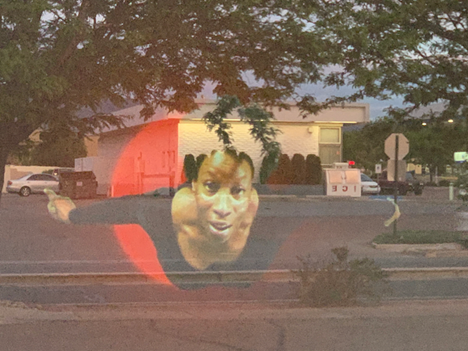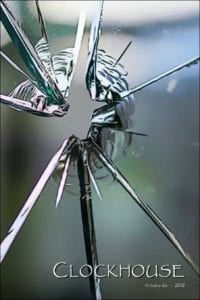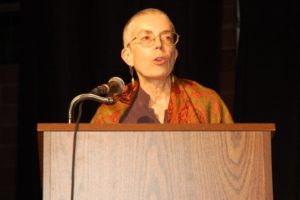By Heather Leah Huddleston
Poets use fewer words than writers of other genres, and maybe because of this, their very existence is oftentimes viewed as somewhat magical, definitely romantic. It seems that everyone these days wants to be a “writer” but not many want to embody the poet’s life. Donavon Davidson proves that poets are no different than writers of other genres, because, really, to all writers, it’s the words that matter—the words that help writer connect with reader and transport them to a place of feeling…to a place that’s real.
HLH: Poets use fewer words than writers of other genres, say fiction or creative nonfiction. Can you talk about the process of picking the right words to convey exactly what you want to say in a poem? And do you think you ever really say it all?
DD: Firstly, I want to thank you for giving me such a wonderful privilege of talking about my work and my process. In regards to finding the right words that speak directly to my themes, it’s always a struggle. Many hours are spent in which I slip into a state of daydream, or meditation, if you will. Sometimes an entire day will go by until the words start to appear. Still, it’s hard to say. There’s something about a phrase that is born in my thoughts, a phrase that presents more questions, that always grabs my attention at first. On the surface, there must be a musicality to them and a certain unexpectedness. It’s only until after the poem is written that I go back and try and fine tune the words. This, I’ve learned, is a very tenuous part of the process. One must not tinker too much with language, or that childlike beauty of them will be destroyed. For let’s face it, when we try and “ground” these images in our adult minds, we lose the magic they first presented us with. Ultimately, it is not as important to understand as it is to feel. Which leads me to the second question. For me, a poem must have space for the reader to get engaged. They bring their own associations, their own experiences. My fingerprint, as the author of the poem, must be negligible. So, no, I never say it all. The reader finishes what I cannot. Only then can a poem truly come alive.
HLH: Would you say your poems are “autobiographical”? If “yes,” then how do you consider yourself as character/subject? If “no,” then where do you find your subjects, your inspiration?
DD: I don’t believe any good poem can be truly autobiographical. One of things I always teach my students is that writing a poem is the last thing a poet ever does, that it is almost an afterthought. To write a truly successful poem, the poet must have a strong intellectual curiosity; they must have a love for a great many things. We tear down the walls of “self” and embody ourselves with the great characteristics of a multifaceted universe. When “I” arrives in a poem, the poet must quickly kill it, or the more profound lesson will not be touched. We must let the experiences of many flow in and out of us, unmarred by preconceived notions. To that end, I am and am not a character in my poems. I am able to feel and experience what I thought I never could. I am able to engage them as a child, innocent and naïve. Sometimes I play with them, as a child would; I create a new logic, rules of gravity. And, also like a child, I misunderstand them, break them, or get scared.
HLH: What do you think is the biggest challenge poets face today? The biggest reward? And do you have any advice for the budding poet?
DD: There are many challenges that face poets today; so many of them are so equally problematic, that it is hard to say there is just one. One of the biggest issues is that poets are in too much of a hurry to write and get published. Little time is spent crafting. The notion of rewriting and revising a poem is lost upon them. Even though I love Kerouac, I mostly blame him for his famous quote: “First thought, best thought.” That was fine for Kerouac who had a lust for experience, and who, by the way, had a photographic memory, not to mention the fact that he did indeed revise. Still, I think his quote is largely taken at face value and not on its greater message–don’t think to death that original idea. Another issue that faces poets today is one of censorship. There are two aspects to this that are having devastating effects on poetry. The first is the censorship of the individual for the community. What I mean by this is that there is such an importance placed upon what others are writing and how they’re writing it. Just within the past few years, a regular brouhaha was caused when an individual mistakenly sent Franz Wright a Facebook message asking if he would be interested in enrolling in an MFA program. What followed was an obscene tirade from Wright, bemoaning the transformation of the poet into automaton by MFA programs. He raised, despite his acrid tone, many great points. However, what followed has a very telling commentary of the sad state of modern poets. Many who felt the need to defend themselves for attending MFA programs cried foul on Wright. In fact, the response was so unanimous, I was shocked Wright wasn’t tarred and feathered or burned as a witch. In my view, their responses only proved his point. Poets are afraid to break free from the herd. The second aspect to censorship pertains to the real fear to take risks. Now, one may argue that this second aspect and the first are related. To a certain extent, this is true; however, I believe this second aspect is more of a private one that seeps in from prevailing social moirés than it does from specific artistic institutions. Call it being politically correct, but the self-censorship of language that challenges our preconceived belief systems and replaces them with only terms and images that have been sanitized by our social peers, is the death knell for poetry. Finally, I believe the most detrimental challenge is this idea—once again passed on from an earlier generation for which their need was much greater—to “make it new.” This quote is attributed to Ezra Pound who, along with the rest of the moderns, was seeking a change from eighteenth century themes and constructs. However, the term now seems to take precedent over all other aspects of artistry. More and more it seems poets are too concerned with trying to be a pioneer or innovator, rather than just writing something that is moving and profound. Let’s change this quote to what we, in the twenty-first century, actually need: Make it real. My advice to all who care to take it will bring about the biggest reward. Don’t listen to what the community, academics, or dead poets tell you. Make it real. Make it real to you. Make it live and breathe the way you want it to.
HLH: What is on your mind or showing up in your work now—what issues or themes are you writing about?
DD: I think I’m still writing about the same thing now as I was when I first began. And, to tell you the truth, I’m no closer now than I was back then to figuring it out. I hesitate in discussing what’s on my mind when I’m writing because, again, I don’t feel the poem is really supposed to be about me. Maybe it was in its inception. But after I put it down on paper, it’s more about the reader, and should be. That said, lately I have been working on revising my manuscript Everything is Conditional Love Poems. It is a series of contemporary experimental style sonnets. They are comprised largely of clichés or euphemisms that have been placed in unexpected juxtapositions with one another. It is at once a commentary of contemporary society and technology as it is with personal relationships. I believe the social imprints of these phrases are so archetypal, so expansive that, as I’ve illustrated earlier, the reader will inevitably bring a unique set of understandings to the text. Also, because of the experimental aspects of punctuation, each time the reader engages with the text, new meanings can be formed, thus forcing the reader into a questioning of what they never questioned. And that, of course, is the exercise with this work. It’s set to come out sometime late this year/early next year through Empty City Press.
HLH: Poets are regarded as serious by nature. Any fun fact you’d like to share about yourself that not many people know?
DD: My humor is notoriously immature and, at times, scatological. I also have a terrible habit of making up lyrics to well-know songs. This is probably more annoying than anything because it is an obsession I’ve had since I was a child. More troubling, I do it throughout the day. Every. Day.
We’re pleased to have the opportunity to re-present an excerpt from Donavon Davidson’s “Confidentially Speaking,” which was published in Clockhouse, Volume 3. If you’d like to purchase a volume, please click here.

From “Confidentially Speaking”:
The universe is expanding
occupational hazards
a dream vacation
carpal tunnel
visions of the future
what happens when we die
the same time
and the same place
location, location, location
Donavon Davidson in the author of Everything is Conditional Love Poems (Empty City Press, 2016). His poems have appeared in many online and print journals, including: Spork, Clockhouse, Thirteen Myna Birds, Anti-, Stirring, Bird’s Thumb, Sink Review, InDigest, Blood Lotus, decomP, Black Heart, Dressing Room, Pirene’s Fountain, Identity Theory, ditch, FRiGG, Softblow, Juked, Pedestal, MiPOesias, Prick of the Spindle, and many others.






